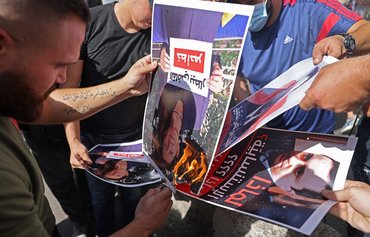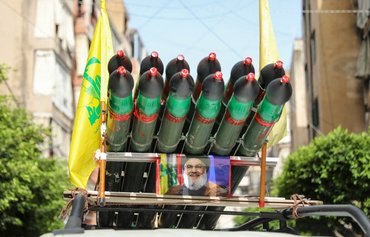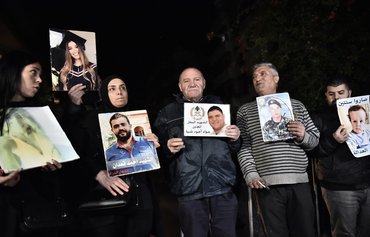BEIRUT -- The violence that erupted in Beirut on Thursday (October 14) as armed militiamen from the Amal movement and Hizbullah stormed through the streets has increased calls for militias in Lebanon to disarm.
Hundreds of Amal fighters -- the most visible force -- poured into the streets of the movement's Shiyyah bastion, firing assault rifles and rocket-propelled grenades (RPGs) towards Ain al-Remmaneh.
Hizbullah fighters also were seen taking part in the fighting, which erupted amid a Hizbullah/Amal rally to demand the dismissal of Judge Tarek al-Bitar.
Militiamen from the two groups took aim at residential buildings on the edge of Ain al-Remmaneh, a Christian neighbourhood separated from Shiyyah by a road that once marked a key demarcation in Lebanon's civil war.
![A fighter from the Amal movement takes aim during clashes in the area of Tayouneh, in the southern suburb of Beirut, on October 14. [Anwar Amro/AFP]](/cnmi_am/images/2021/10/15/32131-Amal-fighter-Beirut-600_384.jpg)
A fighter from the Amal movement takes aim during clashes in the area of Tayouneh, in the southern suburb of Beirut, on October 14. [Anwar Amro/AFP]
They were in turn picked off by snipers, whom Amal and Hizbullah accused of belonging to the Lebanese Forces Christian militia, though the latter issued a statement strenuously denying the accusation.
The Lebanese Forces said Hizbullah was "invading" off-limits neighbourhoods when the violence broke out.
Seven people were killed and 30 wounded in the melee. One was a mother of five hit in the head by a stray bullet inside her home. At least three of those killed on Thursday were Amal members.
The army deployed heavily when the violence broke out, blocking the streets around Tayouneh. It conducted searches in Ain al-Remmaneh buildings to track down snipers and announced nine arrests late Thursday.
But the identity of the first shooter remains a mystery.
Some Lebanese took to social media to argue that no matter who was to blame, the central issue is the militias' refusal to disarm, in defiance of United Nations Security Council Resolution 1559 (of 2004) and related legislation.
A heavy army presence was visible on the streets Friday amid fears of an escalation, as the country marked a day of mourning declared by the presidency.
There is long-standing animosity between the Lebanese Forces party and Hizbullah and the Amal movement, a feud renewed by al-Bitar, who has led the investigation into the August 4, 2020, explosion at the Beirut port.
The explosion, caused when tonnes of ammonium nitrate stored at the port ignited, killed more than 200 people, wounded thousands more and destroyed swathes of the capital.
The Lebanese Forces support the port investigation, which Hizbullah and Amal have attempted to suppress by accusing al-Bitar of political bias. Two former Amal ministers are among the officials al-Bitar has summoned as part of his probe.
Probe must proceed unhindered
The United Nations, United States and France appealed for a de-escalation but also insisted on the need to allow the port explosion probe to continue unhindered.
The United States declined to comment on who was responsible but reiterated its criticism of Hizbullah, which it considers a terrorist group, along with a growing list of other countries.
"Judges must be free from violence. They must be free of threats. They must be free of intimidation, including that of Hizbullah," State Department spokesman Ned Price said.
Russia said Friday it was "extremely concerned" about the tensions and called on all sides to "show restraint".
The latest appeals rulings on the various legal challenges launched by subpoenaed ministers currently allow al-Bitar to resume an investigation that was suspended multiple times.
But with the day of mourning on Friday and a religious holiday running until Monday, al-Bitar's investigation will not resume before next week.
The government headed by Prime Minister Najib Mikati and whose members are all sponsored by Lebanon's hereditary political barons is expected to seek a solution that would allow the investigation to continue but appease Hizbullah.
The Iran-backed group's leader, Hassan Nasrallah, whose influence on the street and in the political arena is unmatched but has taken a hit in recent months, gave a televised speech on Monday in which he unleashed a strident attack on al-Bitar.

![Fighters from Hizbullah and the Amal movement take aim with a Kalashnikov assault rifle and a rocket-propelled grenade launcher amid clashes in Tayouneh, in the southern suburb of Beirut, on October 14. [Ibrahim Amro/AFP]](/cnmi_am/images/2021/10/15/32134-Amal-Hizbullah-fighters-600_384.jpg)






